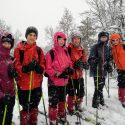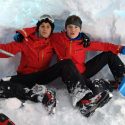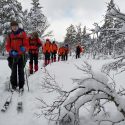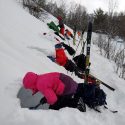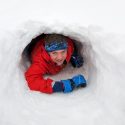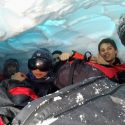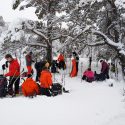Canford School CCF has been embarking for a number of years on a cross-country skiing expedition to Norway on what is described by all who go, as the toughest and the best trip the School offers. This year saw twenty-seven cadets, a fifth of our year 10s aged 14 to 15, challenging themselves in an alien environment, learning a completely new skill and then testing themselves, often to the limit, physically and mentally, on a three-day ski-touring expedition. In order to increase the numbers benefitting from this outstanding experience, a further ten cadets from Portsmouth Grammar School CCF were invited to join the group. The life skills learned and personal challenges overcome are all enormously beneficial to each individuals’ long-term education, whilst the experience itself will live long in their memories. The expedition is not selective, and the weakest applicants invariably learn the most and benefit greatly. This year we were able to include a cadet who was on a full bursary at the School courtesy of the Ulysses Trust, the Connaught Trust and grants from a School trust fund.
The whole team; instructors, school staff and cadets would like to take this opportunity to thank the Ulysses Trust for their generous (and continued) support for the expedition, making it that much more accessible to all cadets at Canford.
Cadet Reflections
Day 1
The first day skiing was such a laugh! All our group were previous alpine skiers so watching everyone go through the painful realisation that they couldn’t do a hockey stop was quite entertaining. You expected it to be similar but in reality, it was completely different. Just as you would start to feel that you were doing it right you would suddenly find yourself eating snow! You felt so ungraceful and wobbly. In the afternoon we ventured into our first step of off piste/backcountry. The powder was a lot deeper, however softer falls meant that it was harder to get up. The hilarious finale would have to be when at the end of the day, Jim took us to the top of a much steeper, more tree packed slope, and told us to just go straight down and we would stop before the ditch. We all navigated many falls and got down at a snail’s pace, until Mr Salmon, gutsy as ever, comes bombing down, manages to stay up and has to throw himself over in order to avoid the ditch. By the end of the day we left probably less confident in our ability but fully hyped up for the days to come.
Day 2
As we began to settle into the rhythm of the skis we got to go further afield and explore new areas over more challenging terrain that really put our skills to the test. There were many falls but just as many laughs.
On our second day our instructor ramped it up and we carried our biggest backpacks full with all of our things and went for a long tour that ended with us building our emergency snow shelters 13 kilometres later having had a well-earned lunch. The tour was a really great opportunity to cement and practice the skills that we had learnt the day before and the fun continued as people added quirky details to their snow holes.
Day 3
More training filled the morning. In the afternoon, we were packing for the expedition. Not particularly good weather that day, and I was a bit worried about the expedition. We also skied around the hill: it was about 5km. I was really tired in the end, and to be honest, thinking about 14 km we needed to do the next day: I was a little bit afraid of it.
On day three I was certainly VERY excited for the expedition. We skied around the training track, and I learnt that skiing off-piste is much harder than on, which side of the mountain you’re on really DOES make a difference to the weather and that it’s good to rotate who’s at the front.
Day 4
I was more nervous than I thought I would be for the expedition. I think it was the slight unknowing of what exactly was to come. These nerves were quickly replaced with excitement when we started skiing through what I can only describe as ‘Narnia’. It was the beginning of the most surreal, most beautiful three days of my life so far. The challenge of the ski itself that day, although hard at the time, isn’t what sticks in my mind. What sticks with me is the snow hole construction at the other end. It was surreal in a way of it felt like you were a little child, building a base, and yet this base had thinking and precision behind it, and it would be our home for the night. The night was…. an experience that I will remember for the rest of my life but not necessarily repeat anytime soon. I fell into a restless sleep while decidedly questioning my decision-making that had got me to a freezing cold, mountain, sleeping literally in the snow.
Day 5
As I said previously, I found the first part of the second day hard. I was hungry as our group only figured out that evening that with the ration packs there was a certain fill line, and so our rations had previously looked like pools of watery vomit. I was tired and I was slightly dreading the first climb that I could see awaited us. However, as we set off, optimism grew. We got to the top of our first climb in half the time that Jim had anticipated, and this, although alongside some skins breaking, boosted morale to the top of the game. We had a beautiful view in front and behind us and according to Jim, we had already done 4km. We were very happy, until around 2km later when Jim went, ‘Right lads so that’s about 4km done’. After that Jim’s words quickly became known as Jim’s exaggerated truths. The day went on, and on, and on, until finally, just as our aching limbs began to give up hope the hut came into view. That night was one much more comfortable than the previous. We had the most stunning sunset and the most beautiful starry sky that I have ever seen. It was a moment that I will never forget.
Day 6
The final day was a day of ‘we are nearly there’. A complete whiteout fully disconcerted us and the downhill was definitely a struggle. However, the feeling of seeing the coach at the bottom was incredible. The sense of accomplishment was amazing, but there was also a kind of sadness that it was all over. It was an amazing experience.
D P Culley
Expedition Organiser
March 2020
Outcomes
Key skill 1: planning. Did you learn the importance of planning for all eventualities and ensuring you were fully prepared? Give an example.
Yes. Planning for all eventualities was definitely a key part. An example of this would be when we were on the training days and one day it got very cold and windy so we all gathered in our bothy bag to warm up and have a bite to eat. Then, when we were going to bed in our quincies we needed to put wet items of clothing such as the shoes in between the bivvi bag and sleeping bag so they didn’t freeze during the night.
Key skill 2: communicating. Did you learn the importance of careful and clear briefing together with good communication between each other? Give an example.
Yes, if you see a dangerous hole in the snow you should stop and tell other people to go around you. This happened more than once and saved a lot of time and effort that would have been wasted in getting out of the hole. I also learned that understanding and having a clear briefing are very important. For example, on the expedition, it was very helpful to know where we were going and what the plan was before we set off so that we knew what to expect.
Key skill 3: teamwork. Did you learn the importance of supporting each other and helping each other when times were challenging? Give an example.
It’s very important to have good teamwork and support each other because it makes you feel like you CAN do it and it encourages you to get on with it. An example of this would be on the expedition, when we were all encouraging each other to do that 15k up-hill, it was very uplifting. We had to work together to get items out of each-others’ backpacks and we took turns breaking trail. When one person was struggling it was really important to encourage them and help someone if they fell over; especially with the expedition packs.
Key skill 4: leading. Did you learn the importance of having a leader? Can you think of an example where it helped?
It was very helpful to have a leader (ours was John (absolutely class guy)) otherwise we would have never have known what we were doing or when we were doing it. Mr Coward was very helpful to also keep us in check and on track, and make sure we knew what we were doing. It was also really important to have a leader when building the snow hole one person needed to be in charge to ensure the process was done quickly and efficiently, before the light went.
Key skill 5: evaluation and reflection. How important is it to think about what you learned? What you would do differently next time? Give an example.
I think it is very important to reflect on what you have done and learn as one goes along: for example, something simple like packing my large rucksack. the further into the expedition I was, the better packed everything was and I had the things I needed quick access to in convenient places. In addition, I think it is important to look back and think about what you have done, as it helps you to learn and realise what you did actually get out of the trip. I think that next time I would have pushed myself a bit further physically, as now I know that I CAN do it, I can see that I could’ve pushed myself a bit harder.

